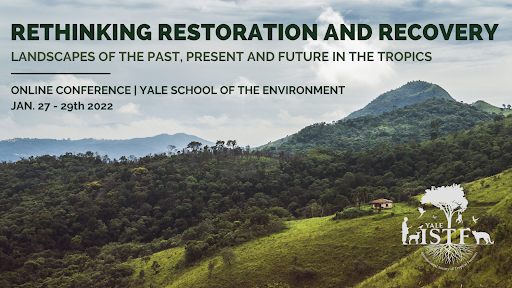International Society of Tropical Foresters hosts 28th Annual Conference
The International Society of Tropical Foresters is hosting its 28th Annual Conference, which will focus on restoration and recovery in the tropics.

Courtesy of Ryan Smith
The 28th Annual Conference hosted by the International Society of Tropical Foresters, or ISTF, began Thursday and will see attendants and panelists from over 90 nations gathering online to discuss landscape restoration and recovery in the tropics.
Organized by students at the Yale School of the Environment, this year’s ISTF conference focuses on the theme of Rethinking Restoration and Recovery: Landscapes of the Past, Present, and Future in the Tropics. Attendees will tackle matters ranging from metrics to finances in the context of tropical forestry and the COVID-19 pandemic. While the conference, which typically takes place in-person at Kroon Hall, was originally to be executed in a hybrid format, it will now take place virtually due to the global spike in COVID-19 cases.
“In this conference we’re trying to raise other voices that go from the field, like from people that are working in projects, Indigenous communities, people that have knowledge and sometimes it’s hard for them to be here,” conference co-chair Claudia Ochoa ENV ’22 said. “This conference is about that. It’s about making sure that everybody has a voice, that everybody can learn, share, and kind of devote some time to reflect.”
Ochoa, an environmental lawyer from Peru, first attended a Yale ISTF conference with the theme of sustainable development in 2016 and emphasized the conference’s role in bringing people together. At a subsequent conference, she met Ryan Smith ENV ’23, who had worked in Peru with Ochoa’s mutual friends. Smith is now co-chairing the conference with her.
This year’s conference will take place from Jan. 27 to Jan. 29 and features speakers from industry, academia, activism and other backgrounds. Over 700 attendants registered for the free conference, according to co-chair Mariana Camacho Fernandez ENV ’22. Relevant topics will include addressing local needs, preserving biodiversity and addressing degradation. Panels for the first day center on political ecology, tropical forest restoration and discussions about the UN Decade on Restoration.
“Every year as a team we try to come up with a theme that’s timely,” Camacho Fernandez said. “This year something that’s really big is the UN Decade of Restoration. Immediately from the get-go when we sat down as co-chairs over the summer to think about what the conference should look like, we knew that it had to have some sort of connection to the UN Decade of Restoration.”
This year’s conference is sponsored by the Cullman Institute, the Leitner Family Fund, the Yale MacMillan Center’s Council on Latin American & Iberian Studies and two YSE learning communities in addition to the Yale School of the Environment.
The conference was intended to take place in a hybrid format with online attendance and in-person keynotes, according to Smith. In a normal year, participants typically number around 250 and gather in Kroon Hall, but due to the rapid rise in COVID-19 numbers, members will now tune in from around the world.
“With the virtual format, there’s a silver lining,” Smith said. “It does make it more accessible to more people who otherwise wouldn’t be able to attend …We don’t know exactly how many will be attending [each session], but just by the sheer number of registrants, we already have like 150 more than we did last year.”
Smith also emphasized the role that social media plays in advertising and highlighted the work of Carolina Sánchez ENV ’23, who led the ISTF communications team in publicizing the conference.
The conference will begin with an introduction from Florencia Montagnini, Director of the School of the Environment’s Program in Tropical Forestry and Agroforestry, and will end with closing remarks from Liza Comita, professor of Tropical Forest Ecology.
“Generally, we were looking for diversity in theme, geographic origin, gender, race, etc,” panels team member Nadeem Demian ENV ’22 GRD ’22 wrote in an email to the News. “To speak specifically for the finance panel, we were looking specifically for a representative from Emergent Forest Finance Accelerator, which has received a lot of press in recent history for its essential role in facilitating the Lowering Emissions by Accelerating Forest Finance (LEAF) Coalition, someone from a government perspective, and someone who helps enact these financing schemes ‘on the ground’ in forested countries.”
Demian expressed faith in the panels’ ability to explain the finances of tropical forestry. He emphasized the caliber of speakers at the conference, which includes Senior Advisor at Norway’s International Climate and Forest Initiative Hege Ragnhildstveit, Emergent Vice President of Markets Bryan McCann and EcoAgriculture Partners Finance and Policy manager Juan C. Ramos.
Fellow member of the panels team Charly Frisk ENV ’23 also noted that Minnie Degawan, an Indigenous Kankanaey-Igorot person from the Philippines who contributed to the UN Declaration on the Rights of Indigenous Peoples will contribute “a lens to the panel which centers such justice and accountability that must be centered at the forefront of environmental efforts.”
The Yale student chapter of ISTF was established in 1989.







